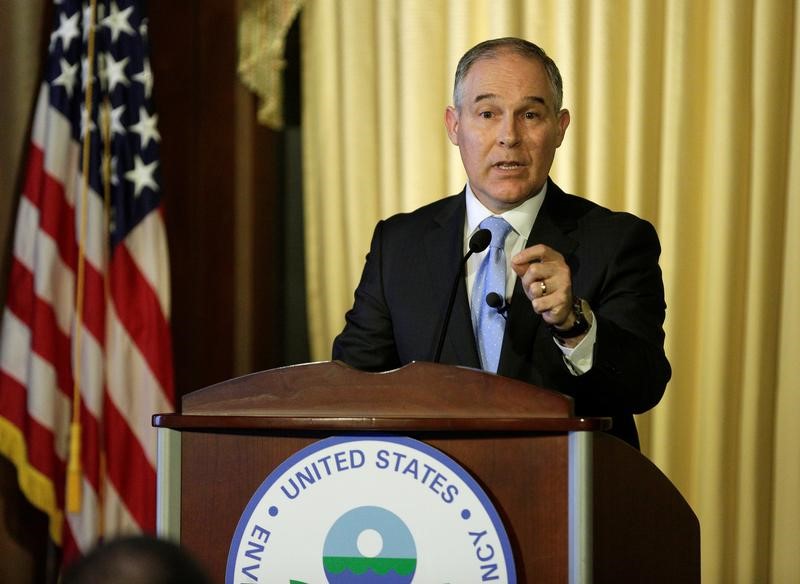By Timothy Gardner and Valerie Volcovici
WASHINGTON (Reuters) - The White House is proposing to slash a quarter of the U.S. Environmental Protection Agency's budget, targeting climate-change programs and those designed to prevent air and water pollution like lead contamination, a source with direct knowledge of the proposal said on Thursday.
President Donald Trump has long signaled his intention to reverse former Democratic President Barack Obama's climate-change initiatives. But the Republican president has vowed his planned overhaul of green regulation would not jeopardize America's water and air quality.
The 23-page 2018 budget proposal, which aims to slice the environmental regulator's overall budget by 25 percent to $6.1 billion and staffing by 20 percent to 12,400 as part of a broader effort to fund increased military spending, would cut deeply into programs like climate protection, environmental justice and enforcement.
Politico and other news outlets reported the staff and overall budget cuts earlier, but the source disclosed new details on the impact the cuts would have on programs and grants to states.
Environmentalists slammed the proposed cuts, which must be approved by the Republican-led Congress.
The agency did not immediately respond to a request for comment on the budget proposal or its counter proposal. The White House said it had no comment.
Under the proposal, which was sent to the EPA this week, grants to states for lead cleanup would be cut 30 percent to $9.8 million, according to the source, who read the document to Reuters.
Grants to help Native American tribes combat pollution would be cut 30 percent to $45.8 million. An EPA climate protection program on cutting emissions of greenhouse gases like methane that contribute to global warming would be cut 70 percent to $29 million.
The proposal would cut funding for the brownfields industrial site cleanup program by 42 percent to $14.7 million. It would also reduce funding for enforcing pollution laws by 11 percent to $153 million.
The budget did not cut state revolving funds for programs, that Congress tapped last year to provide aid to Flint, Michigan, for its lead pollution crisis.
All staff at a research program, called Global Change Research, as well as 37 other programs would be cut under the plan.
CONGRESSIONAL HURDLES
Some of the cuts are unlikely to pass the Republican-led Congress as they are popular with both Democrats and Republicans. Congress would be unlikely to approve a proposal to cut all staff in a diesel emissions program, for example.
Scott Pruitt, the new head of the EPA, told U.S. mayors on Thursday he would make a priority of cleanups of industrial and hazardous waste sites and improving water infrastructure, even as the White House proposed severe proposed cuts to those programs.
"In this budget discussion that is ongoing with Congress that is just starting, there are some concerns about some of these grant programs that EPA has been a part of historically," Pruitt said.
"I want you to know that with the White House and also with Congress, I am communicating a message that the brownfields program, the Superfund program and the water infrastructure grants and state revolving funds are essential to protect," he said.
Greenpeace spokesman Travis Nichols said: "As a candidate, Trump made a big deal out of EPA's failure in Flint, but now he's cutting 30 percent out of lead cleanup in his proposed budget. This is an example of his empty promises to do right by the American people."
Officers of the Environmental Council of the States, composed of local regulators, raised concerns to the White House and EPA about the budget process, which they said lacked input by directly affected states.
ECOS officers will meet with the environment team of the Office and Management and Budget, a White House office, on Friday and have slated a teleconference with Pruitt in March.

ECOS head Alexandra Dapolito Dunn said states had been hopeful after Pruitt's confirmation hearing that they would get resources to do their work. "Now they are feeling very vulnerable,” she said.